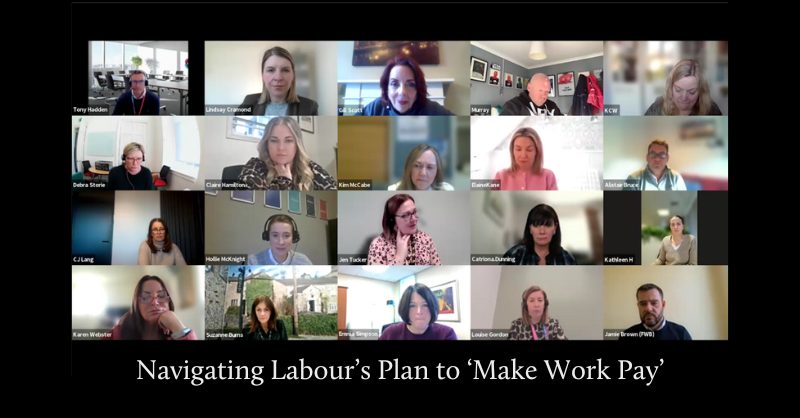Contact the team at FWB to discuss your individual or company requirements, or to discover more about our specialist services.
CFO Forum – Covid-19 | Thursday 9th April
17 April 2020
- Thought Leadership
On Thursday 9th of April, Directors from FWB Park Brown (Michael Dickson, Jamie Brown, Graham Burns) hosted the latest CFO Forum, via Zoom. This brought together 14 CFOs from a range of industries including Construction, FMCG, Logistics, Retail and Professional Services.
The purpose was to share experiences and strategies relating to how we are approaching the current financial and business challenges due to Covid-19.
In this second forum, although many are still in ‘crisis mode’ there had been a significant shift in mindset and strategy within several businesses to begin future planning. With steps having been taken to protect business continuity in the past few weeks, and in addition to continued discussions around liquidity and financing options, there was a lot more focus during this discussion in regards to what opportunities and efficiencies could be born out of this.
The conversation was conducted under Chatham House rules and a very open and valuable discussion ensued covering, amongst others, the following topics:
Cash Flow and Liquidity
- In addition to tight but empathetic credit control processes; bridge funding through government relief or traditional banking; stock re-sale; and cross currency swaps discussed previously, there was a lot of discussion regarding deferring VAT, NIC and even PAYE payments. The group shared experience in pursuing deferrals of these with varying degrees of success. This ranged from long term deferrals to being asked to apply monthly for each deferral. The advice was to be firm but work ‘in partnership’ with your individual Business Relationship Manager in HMRC.
- Since the last CFO Forum both the CBILS and more (but not universal) access to funding for charities has been announced. The charity CFOs felt more support was needed as there was very prohibitive eligibility criteria. The larger businesses, eligible for CBILS, were pleased at this development but like those applying for CBILS felt the process was cumbersome and slow for access to the funds.
- There has also been mixed success in requesting rent holidays. Some businesses have gone as far to withhold rent payments from less sympathetic landlords due to the ‘no eviction’ protection right now.
Furlough and Employee Remuneration
- The proportion of staff in business who have gone onto the furlough scheme varies, but largely sat between 50%-90% of workers in ‘non-essential’ businesses.
- Many of the staff retained, across all levels of the organisation, have been asked to undergo temporary salary reductions. Varying models for this were discussed, including: a tiered income tax like approach; universal 80% to match furlough; highest cuts at executive level; and cuts proportionate to savings made through working at home.
- Advice from those industries which have been through significant crisis/volatility in recent years i.e. Financial Services / Oil & Gas centred around how to stage cuts. Whilst there is no “right way”, experience of those who have been through it indicated it was better to “cut hard and once” as opposed to continually cut salaries and restructure in stages, with the latter having a longer term impact on morale and people.
- The question was raised as to whether the Job Retention Scheme has now reached such scale and uptake that it is too big to fail or if it’s been so ‘over-subscribed’ that the government cannot sustain it for the longevity many businesses will require.
- Either way, the common view was that there will be inevitable redundancies when the furlough scheme comes to an end if the lock-down continues much longer. An announcement is expected soon in regard to its longevity and in the meantime many businesses are planning for this eventuality as part of wider restructuring plans.
- Many companies discussed pausing performance management, cancelling mid-year reviews or calculating any end of year bonus/reward discussions indefinitely. Many employees are unable to work the same hours or with the same level of productivity as before, either due to their role being affected more than others or due to personal circumstances and commitments at home. Therefore to be fair and motivate everyone in the right way this will all be based on the latter half of the year.
Operations
- For many organisations, necessity has driven restructure in supply chain and business operations. Many are having to review and identify new distribution models to cope with increased transportation costs and supply availability nationally and internationally.
- Businesses with manufacturing operations are adjusting to change in production processes to ensure they comply with new health and safety and social distancing guidelines. Coupled with the availability of skilled labour (given absenteeism and temporary staff) this continues to prove a challenge. Some organisations have created team rotations and shift patterns to counter this and are paying staff full pay even when ‘off-rotation’.
- An improvement in business communications and messaging has limited absenteeism and helped businesses maintain employee engagement, focusing on people and community as opposed to profit.
- However, with more flexible working also comes possible mental health risks, including employees being constantly logged on and not taking regular breaks and personal time. For others it will create too much flexibility and choice and therefore a threat to urgency and productivity.
- Many organisations have become involved in supporting the containment and relief efforts through the production and distribution of products for the NHS and support services and see this as possible new revenue streams going forward.
- There was consensus that there is significant opportunity for organisations and steering groups/membership organisations to collaborate further. This can not only leverage supply chains but will also put more weight behind campaigns for consistency and clarity of messaging between UK and Scottish Governments, especially within the construction and manufacturing industries.
The Future
- There appears to be a significant and seismic change in how businesses will fundamentally operate including a number of organisations considering offering home working as standard.
- Given greater adoption and use of technology for business meetings and communication, travel and property costs are expected to reduce in the long term and will open opportunities to new talent pools and a more flexible workforce.
- Several businesses have reported a significant increase in, or altogether new, eCommerce activities. Whilst it has not been simple to adjust to this overnight this may allow businesses to operate leaner and more agile in future as well as providing an entirely new revenue stream for some organisations.
- There was agreement from those who, although impacted greatly, can see a future for the business and that this appears to be a fantastic opportunity to spend time on future strategic initiatives, change and innovation. Some examples of these included:
- Process improvement and automation
- Internal systems implementation and customer app development
- Learning & Development initiatives for retained or returning staff
- Previously neglected margin / product performance analysis
- Exploring new revenue streams, some of which may be technology enabled (e.g. e-commerce) or led by consumer mindset shift
- Sustainability initiatives around climate change, economic and social impact such as new travel policies.
- Many of the CFOs had IT/Technology in their remit or Board Accountabilities, and with the increased use of technology, remote access, applications and communications tools there is also a new and stricter requirement for best in class IT and Cyber Security. This is a skill set that many businesses believed they will need to recruit for, up-skill or develop.
- There have also been other been short term requirements in recruitment despite the uncertainty, largely around the engagement of Interim professionals across the Executive, Project and Skilled Labour. This includes a demand for experience in internal and external communications, corporate finance, business restructuring, organisational design & development and digital transformation. This is likely to continue into the medium-term future.
For a downloadable copy of the above article please click here.
The CFO Forums will be hosted on Zoom weekly, every Thursday from 6pm.
For further details on this, or future events, please don’t hesitate to get in touch with Michael Dickson, Jamie Brown or Graham Burns on:
michael@fwbparkbrown.com
jamie@fwbparkbrown.com
graham@fwbparkbrown.com
[divider line_type=”Full Width Line” line_thickness=”1″ divider_color=”default”]
FWB Park Brown
FWB Park Brown continues to deliver its full range of services which includes providing support and advice during the Covid- 19 Public Health and developing global economic crisis.
We have established a range of cross sector as well as sector focused discussion forums for Chairs, NEDs, CEOs and all the main business management disciplines. We are also working closely with the Scottish HR Leadership Group to provide constructive support including discussion forums and Q & As.
Summaries of the discussions will be posted on our news section and also on LinkedIn.
For further information about any of these forums please contact us via enquiries@fwbparkbrown.com





